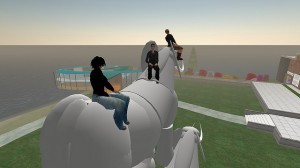Virtual Economies

Upon arrival in Seattle, Mikael, the driver who picked us up on Valve’s behalf, asked me: “Here for an interview, Sir?” I answered that, no, of course not; that I was just visiting Valve for a couple of days. Little did I know! Upon entering Valve, I was met by a group of mainly young persons, gathered together in a meeting room, presided over by Gabe who took no time before asking everyone to introduce themselves and to explain what they did. Jetlagged and sleepless, and confronted by a wall of information about things that I had no prior experience of (indeed, the last time I had played a computer game was Space Invaders at University in the mists of 1981 or so!), I struggled to keep up. Soon, however, I realised that this bunch of people were not just weird but also wonderful and, to boot, that what they were describing, the digital community they had facilitated into existence, was an economist’s dream-come-true. Think of it: An economy where every action leaves a digital trail, every transaction is recorded; indeed, an economy where we do not need statistics since we have all the data!
Video game development company Valve just hired Greek economist Yanis Varoufakis to study the virtual economies created for games, and that got me thinking about what, if anything, we learned from the virtual world of Second Life.
I asked my friend Rubina what she thought about virtual economies because she was once a Second Life reporter for Reuters in 2007. Her name was “Rubina Reuters.” She wrote about how much money people spent on virtual weddings and artwork, and how the currency markets worked.
“Basically, artists would set their own prices,” she said. Just like in real life! And just like in real life, people were making an actual living doing it. It’s funny to think that you can make a lot of money selling virtual items to people, but that’s basically how Farmville made a killing.
“Honestly, the whole thing was overhyped,” Rubina said. “Hundreds of companies went into Second Life thinking of it as a revolutionary way to advertise. But they was no ROI.”
“And all of this died out, right?” I asked.
“Definitely. It was kind of boring, to be honest. Like a video game with no real goal.”
“Just like real life!”
“Exactly.”
Photo: Flickr/Pierre-Olivier
Support The Billfold
The Billfold continues to exist thanks to support from our readers. Help us continue to do our work by making a monthly pledge on Patreon or a one-time-only contribution through PayPal.
Comments